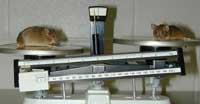Getting to know our inhabitants more thoroughly
2010/03/20 Lakar Iraizoz, Oihane - Elhuyar Zientzia

It is not new that our body is home to millions and millions of microbes. We know we have more microbes than cells: about ten microbes per cell. Many of them are in the intestine and help us to make digestion and absorb various nutrients.
We knew them. Now, however, researchers from different universities and research centers have seen that these small living beings of our interior have other functions and characteristics.
On the one hand, in an ambitious European project called the HIT Standard, humans have produced a catalogue of genes from most of the microbes we have in the intestine; 124 people have obtained microbes from adults' feces and have sequenced their genes. The objective was to know the genes of our intestinal microbes. In a next step, when they know the function of all these genes, they will be able to know the concrete influence of each microbial species in our body.

Although no studies have been started to know the functions of the genes, this first approximation has provided a significant data. In fact, it has been found that the sum of the genes of all the microbes studied in the study results in a group of 3.3 million genes. Therefore, there can be a huge variety of functions in our intestine, considering that in our DNA there are only 23,000 genes.
It must be taken into account that genes from a thousand species of bacteria have been collected in the collection, but each of us does not have all microbial species. The researchers estimate that each individual has about 160 of the thousand studied.
More than to help in digestion
Without analyzing the functions involved in the genes, other researchers devote themselves directly to the search for functions. And also find it. For example, a team of researchers at the University of Pennsylvania has found that the bacteria we normally have in the intestine help our own immune system to be in the form of serene, prepared to fight possible pathogenic bacteria.
At the starting point of this research, the researchers wanted to know why infections are administered when we are in an antibiotic treatment. This is typical because antibiotics kill not only the bacteria that produce the infection, but also many other intestinal bacteria, leaving the place "free" to other pathogenic bacteria.

The researchers have found that when the bacteria we have in the intestine disappear, the immune system slows down and, then, has less capacity to cope with new infections that may arise.
Aside from the benefit they bring to the immune system, a group of researchers at Emory University have found that the intestinal bacterial community can change our feeling of hunger and metabolism.
These researchers have explained that the immune system is responsible in itself for the intestinal bacterial community being controlled. However, in some experiments with the mouse they have seen that if the cells of the immune system lose this control capacity there appear problems of metabolism. Mice that do not have the right immune system, besides eating more and being thicker, have levels of triglycerides, cholesterol and blood pressure higher than the rest.
And all this by action of bacteria, in part. And it's about to see what other functions researchers find over time...
Published in Ortzadar

Gai honi buruzko eduki gehiago
Elhuyarrek garatutako teknologia





